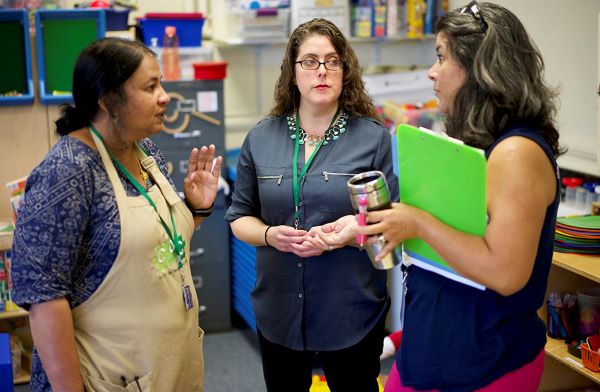Many early childhood professionals and health experts may need support developing new skills for successfully engaging families and partnering with community members. These resources may help identify agencies and individuals who can help your program strengthen Head Start health and mental health services to better meet the diverse needs of children and families. There are tips and strategies for improving communication and building strong collaborations with families and community members to help address pressing or emerging health concerns.
Tips and Strategies for Training Staff
- Prepare staff who will be leading meetings with community partners on best practices. Ensuring Collaborative Partnerships: Strategies for Effective Meetings, Decision-making, and Conflict Resolution can strengthen the skills needed for conducting effective meetings, making collaborative decisions, and addressing conflicts that are crucial in developing effective partnerships.
- Share Community Health Partnerships: Tools and Information for Development & Support with program leaders to help them learn how to promote the development and sustainability of community health partnerships that include leadership from both business and business-led health coalitions and public health officials. This information can help programs at all stages of their collaboration process.
- Explore Strategies for Partnering with Child Welfare Agencies to learn strategies for planning partnerships with child welfare agencies. Find guiding questions and action steps for building effective, engaged, collaborative relationships to strengthen family well-being.
- Use Supporting Community Health Partnerships to learn how to identify the people and agencies that can assist in strengthening Head Start health services, and the importance of creating partnerships with local health care providers and agencies to meet the diverse needs of children and families.
 Collaborating with Families
Collaborating with Families
Leaders who manage health services must collaborate with families as partners in the health and well-being of their children. Remember, families are experts about their own children. They can inform program staff and community partners about cultural values and traditions. Families bring a valuable perspective to the HSAC on the availability and responsiveness of health care services through their experiences as consumers. Health services managers support family members to become advocates for their children, their family, and their community.
Head Start staff communicate frequently with families about their child’s health and development and have a responsibility to make sure families can understand and use health information. Health literacy is how well someone can find, understand, and use basic health information and health care services. When families can read and understand prescriptions, directions, medical forms, and patient education materials, they can make healthy choices.
Tips and Strategies for Collaborating with Families
The following resources can help you and other staff learn more about health literacy practices:
- Health Literacy Toolkit for Early Childhood Programs supports the use of health literacy practices in early childhood programs. It lays a foundation for early childhood programs to further develop as health-literate organizations. A resource for increasing knowledge and skills, this toolkit also gives best practices for organizational health literacy.
- Improving Health Literacy for Families is a video that includes information about health literacy resources to help support families through healthy and not-so-healthy times. Discover ways to help families understand, appreciate, and involve children in learning about and caring for their bodies.
- Health Literacy: Tips for Health Managers include strategies to help families understand health information so they can make good health choices.
Use these resources to help staff learn more about engaging with families:
- Connect staff with training opportunities on the Individualized Professional Development (iPD) Portfolio. The Building Partnerships with Families course helps staff who work with families enhance their knowledge and practice about engaging families using strengths-based attitudes, relationship-based practices, and reflective practice.
- This Virtual Lab School course on Family Engagement increases understanding of family-centered practice and a program leader’s role in creating a respectful climate for families and staff. Learn about responsive practices that reflect family diversity, develop positive communication skills, and use a strengths-based approach to support staff working with families of children with disabilities, military families, and families facing challenges.
- The Best Practices in Family and Community Engagement Video Series is designed to support each program’s efforts toward systemic and integrated engagement. The videos highlight examples of innovative approaches to engagement that foster strong relationships with families and lead to positive outcomes for children and families.
Read more:
Resource Type: Article
National Centers: Health, Behavioral Health, and Safety
Audience: Health and Mental Health Services Staff
Last Updated: August 9, 2024